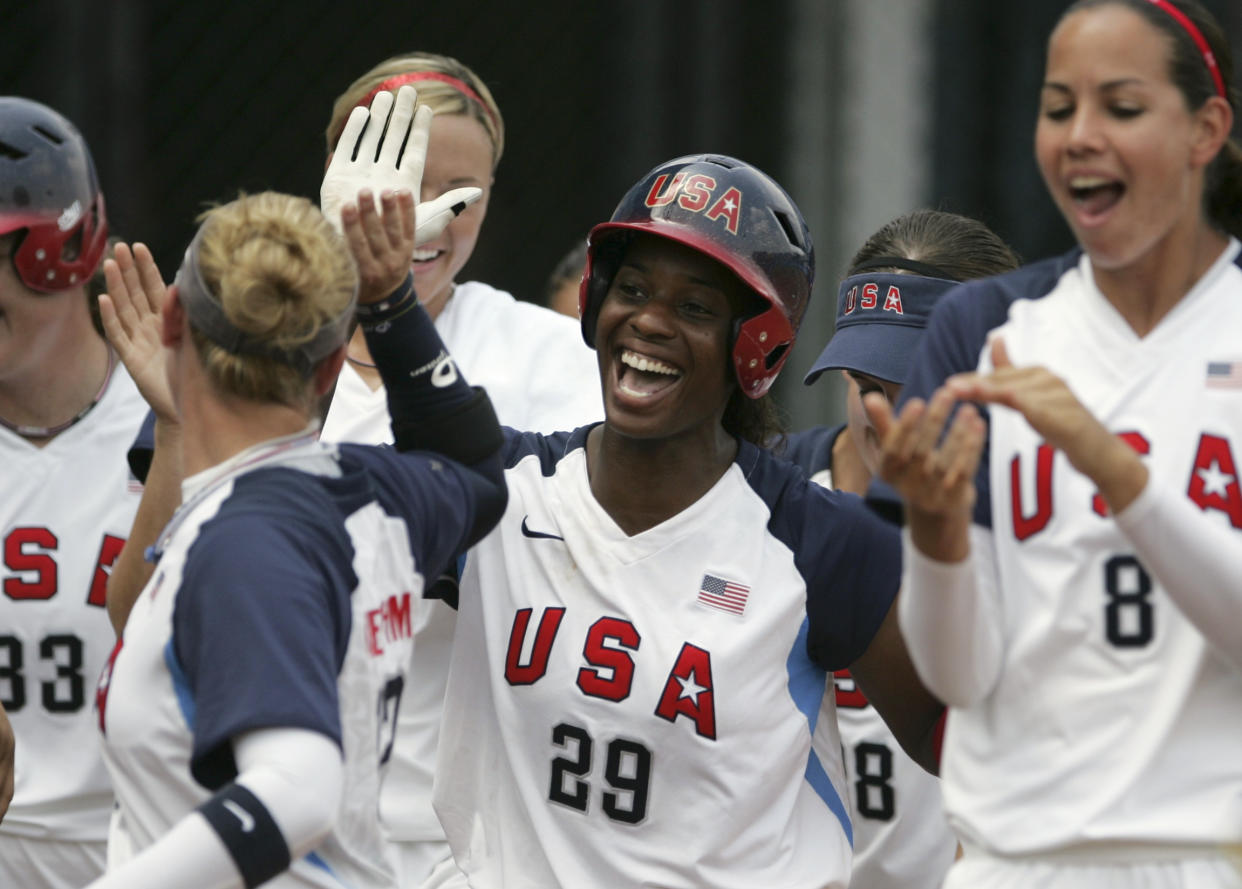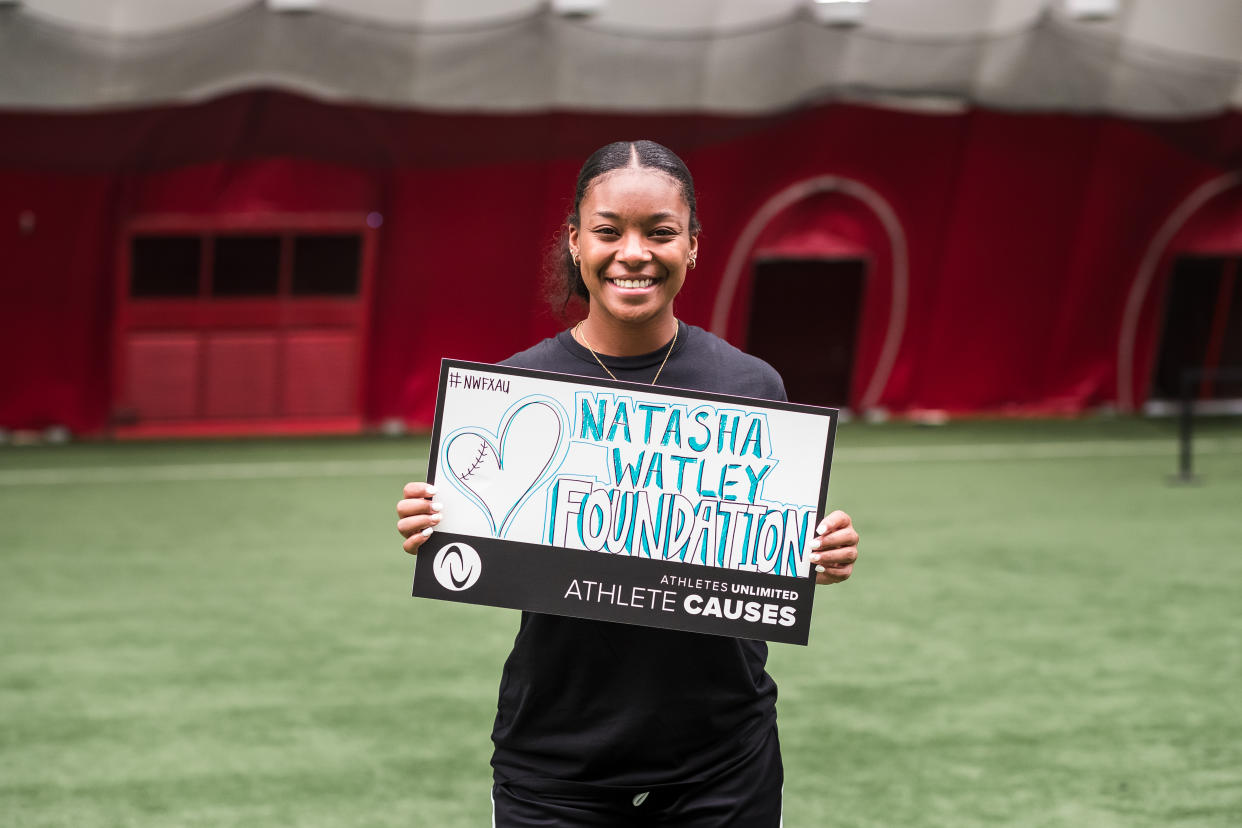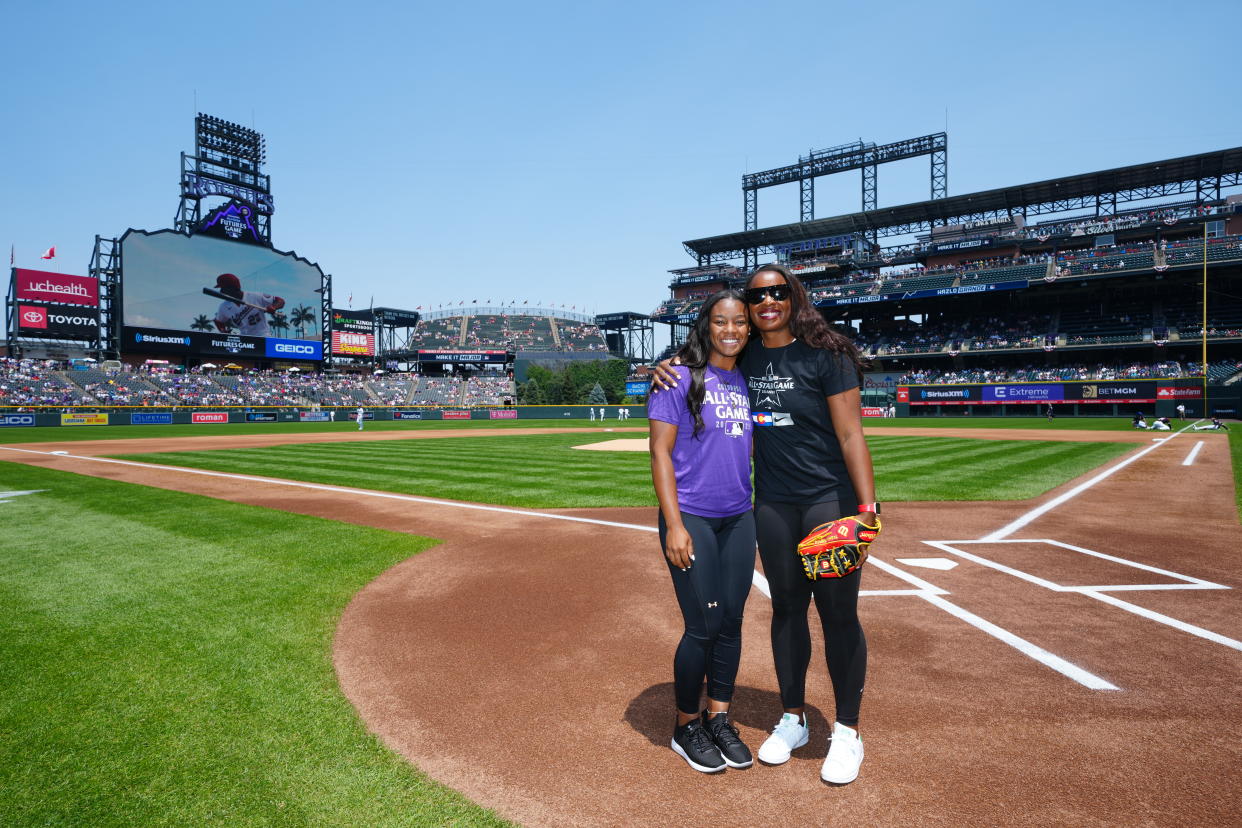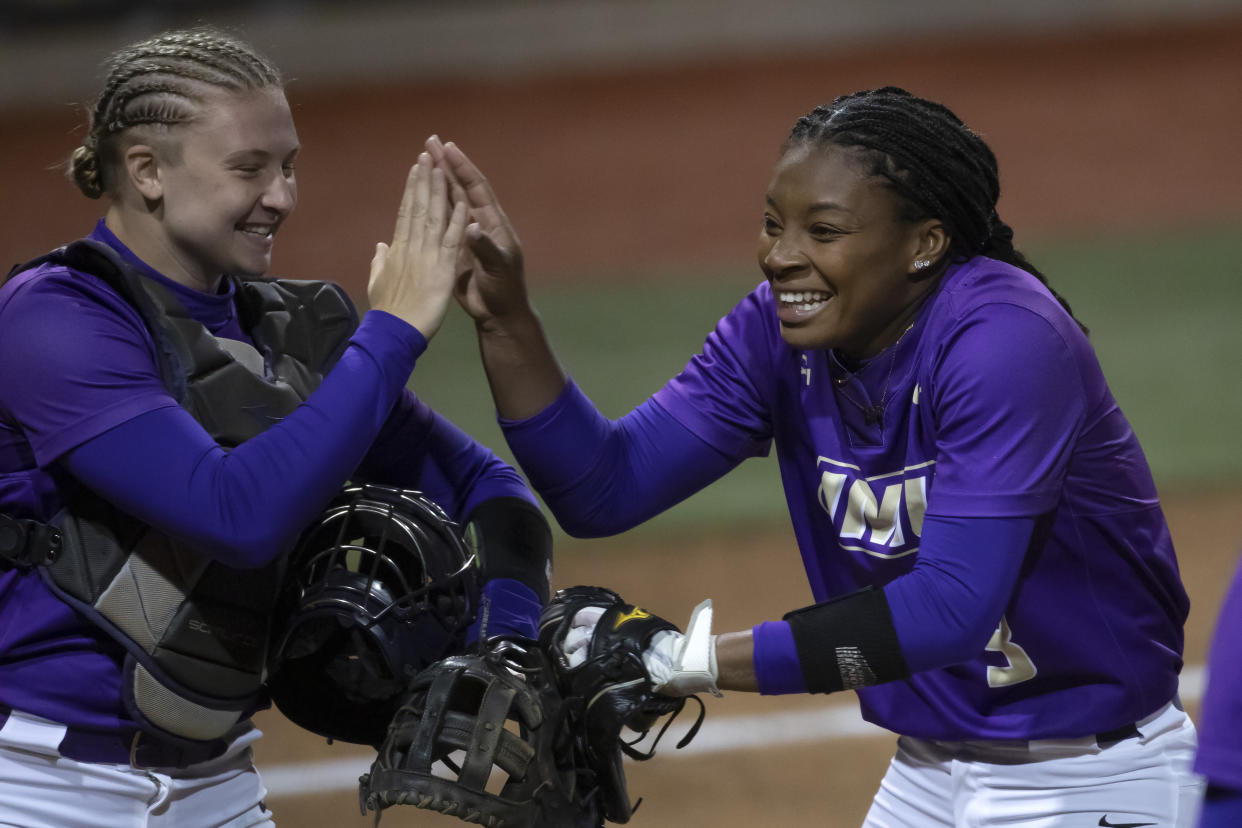Athletes Unlimited softball highlights Natasha Watley’s legacy of advocating through her game

Natasha Watley was different. So different that when she met fans during the peak of her softball career, even they stood out.
Watley was the first Black player to appear for Team USA softball in the Olympics in 2004. A two-time Olympic medalist, she was also a four-time All-American shortstop and 2003 NCAA national champion with UCLA.
“I'm signing autographs after our Olympic tour, and predominantly my whole entire line is like every little African American girl that was in attendance,” Watley recalled in an interview with Yahoo Sports. “That made me realize how important the work that I’m doing now is.”
She started the Natasha Watley Foundation in 2009 before retiring in 2017, aiming to help diversify the sport by making it more accessible. Her organization, paired with Athletes Unlimited’s “Athlete Causes Program,” has given players the ability to advocate for that growth without taking their focus away from the game.
This will be on display when the player-led league’s season begins Thursday in Chicago, during which seven athletes will play in support of Watley’s foundation for five weeks of fantasy-style competition. Those athletes are Hannah Flippen, Anissa Urtez, Aliyah Andrews, Delanie Wisz and Odicci Alexander.
Last season, the same number of athletes made NWF the most popular organization in the league’s fundraising program among softball players — a title the foundation has held since the league and the program’s inception in 2020.
In Athletes Unlimited’s unique model, teams have “facilitators” instead of coaches and are mainly led by captains. In addition to their base salaries, players earn win bonuses and end-of-season bonuses calculated by their points-based leaderboard positions.
The “Athlete Causes Program,” is part of the league’s “core tenant” of empowerment, Hilary Meyer, senior vice president of impact, told Yahoo Sports. Through it, the causes of each athlete’s choosing are given a donation to match their season win bonus.
In June 2022, Athletes Unlimited reached $1 million given through its “Athlete Causes Program” across all of its sports. Having received $67,148 in donations, the Natasha Watley Foundation is the program’s top cumulative earner overall.

NWF used those funds to expand from what began as a small softball league for young girls in Los Angeles’ underserved communities. Now, the foundation has mentorship events and three different sponsorship programs for Black, African American, Hispanic and/or Native American girls between the ages of 8 and 18. One program aims to help with equipment costs for a new, young player, one to support a more experienced player’s travel ball costs and one to financially support a college student who also mentors/coaches younger players.
The program also was able to introduce a weeklong summer camp last year with a “low barrier of entry,” allowing girls to learn from high-level coaches for five days straight.
All of these opportunities are limited to residents of Southern California. But Watley, who is from Irvine, California, is working to expand. Since 2009, eight athletes impacted by the foundation have gone on to earn softball scholarships, something Watley also hopes will grow.
Beyond NWF’s impact on the future of the game, the foundation is impacting current professionals by removing a potential stressor.
“Word is that in other spaces, athletes have been tentative to speak out about what they care about and what they believe in because of repercussions from the league or from other folks who might not agree with what they’re passionate about,” Meyer said. “This gives an opportunity for athletes to really choose whatever matters to them.”
Advocating through action
The need for softball’s increased diversity and accessibility isn’t something Watley remembers overtly thinking or speaking about during her career, but she knew it was important.
“The mindset was to compete. The best way to be a role model and an example is to be that on the field, and that was my main focus,” she said. “I do say that I wish I was more vocal about [inclusion], I just thought that seeing me was enough.”
For Athletes Unlimited star Odicci Alexander, who is Black, seeing Watley was more than enough.
The 25-year-old is a former James Madison standout pitcher who rose to stardom during an unlikely run to the 2021 Women's College World Series. She was nominated for an ESPY Award for best female college athlete and signed a deal with Under Armour after that season. She later joined Athletes Unlimited and opted to play in support of the Natasha Watley Foundation, joining an already significant group of players with the same cause.

Watley calls the Athletes Unlimited players who support her foundation “built-in examples” for the girls she aims to help through her foundation. Sometimes appearing at events and serving as an NWF mentor, Alexander views Watley as an inspiration.
“I always fan girl when I see Natasha because obviously, she's the one I was looked up to when I was younger,” Alexander told Yahoo Sports. “She's so many athletes’ role model.”
The Natasha Watley Foundation reminds Alexander of the hands-on mentorship and support she missed as she grew up in the sport, something she works to give future generations in multiple ways.
“[Watley] shows them that you can do whatever you put your mind to. So it’s something I wanted to be a part of,” Alexander said. “I feel like it helps me look back on my younger days when I never had that.”
In 2022, the number of Black players across all divisions in NCAA softball was 5.6%, 21% identified as other and 73% were white. That year, Alexander joined Howard University as an assistant coach and offered her expertise to HBCU student-athletes, a group that has historically lacked funding and support.
There hasn’t been much of a shift from the demographics during Alexander’s breakout year in 2021 when 5.2% of NCAA softball players were Black. The NCAA’s Student-Athlete Demographics data ends at 2012, when that percentage was 5.8.
Despite the numbers, Watley and Alexander both expressed confidence the game is growing to be more diverse, a sentiment that’s likely been informed by their hands-on experience.
Beyond representation in sport
Growing up, Watley looked up to Atlanta Braves and Los Angeles Dodgers players. Alexander looked up to Watley. Los Angeles native Asia Bryant, an incoming college junior, looks up to Alexander.
Bryant remembers becoming involved with NWF when she was “8 or 9 years old.” She’s a prime example of just how impactful representation paired with tangible support and mentorship can be.
“I didn’t know anything about softball,” Bryant said. But she had a willingness to learn. She won an essay contest and had the opportunity to meet Watley, an experience that ultimately changed her life.
“It made me want to take it serious,” Bryant recalled. “And then from there, I think I blossomed as far as like an athlete. I ended up playing travel ball for a lot of organizations.”
This spring, Bryant graduated from Los Angeles Harbor College, a community college in Wilmington, California, where she was an offensive standout. She earned All-South Coast Conference second-team honors there, after leading the Seahawks in doubles, triples, home runs, RBI, walks and slugging percentage.
She plans to attend Grambling State University in the fall and take a year off from softball to focus on her criminal justice studies. It’s her dream to become a lawyer, but ultimately, she wants to be an example like Alexander.
Bryant describes Watley as someone who “blessed her with an opportunity” and taught her about confidence, networking and getting out of her comfort zone. When she talks about Alexander, she goes full fan mode.
“To watch her thrive at the main stage and give 100%, she left it out on the field. It was just amazing to see such athleticism displayed at such a primary position,” Bryant gushed over Alexander’s Women’s College World Series performance.

In the same way that Alexander inspires her, she wants to set an example that sports can be an avenue to education, especially at HBCUs.
“I want to show young girls that you can do this, too. It doesn't matter what you look like or where you come from,” she said.
This cycle of mentorship and inspiration isn’t limited to those involved with NWF. Athletes Unlimited’s “Athlete Causes Program” applies to all of its sports, featuring a plethora of organizations that players like Alexander will be thinking about when they make highlight plays.
“Being out there on the field and knowing I'm playing for something way bigger than me, it pushes me even more,” Alexander said. “When you're playing for something, things come out that you never even thought you could do.”
Morgan’s Message is lacrosse’s most popular cause, which aims to “eliminate the stigma surrounding mental health within the student-athlete community.” The softball season will run simultaneously with lacrosse, with both seasons set to air exclusively on ESPN.
